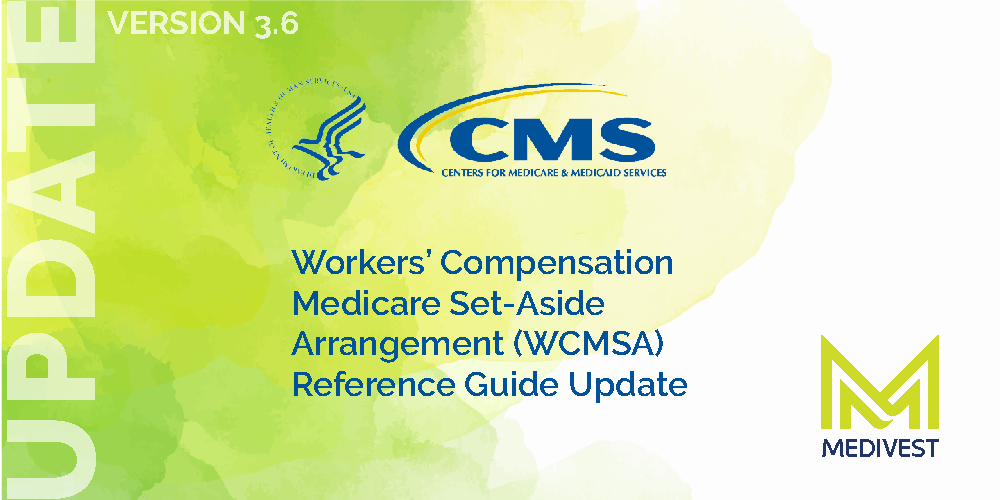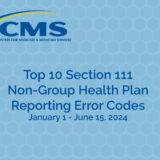WCMSA Reference Guide Version 3.6 Updates of Significance
March 24, 2022 by Medivest

The Centers for Medicare & Medicaid Services (CMS) released a revised Workers’ Compensation Medicare Set-Aside Arrangement (WCMSA) Reference Guide (“Reference Guide”) Version 3.6 on March 15, 2022. This Reference Guide replaces Version 3.5 on January 10, 2022. There are a few notable changes when comparing the two Reference Guides. The blue highlights below indicate the updated changes provided in Reference Guide Version 3.6.
To download the new WCMSA Reference Guide v3.6 click here.
Version 3.6 of this guide includes the following changes:
Clarification has been provided regarding the use of non-CMS-approved products to address future medical care (Section 4.3), as well as documentation and re-review tips (Sections 9.4.1.1, 10.2, and 16.1).
4.3 The Use of Non-CMS-Approved Products to Address Future Medical Care – Additions and Replacements
A number of industry products exist for the purpose of complying with the Medicare Secondary Payer regulations without participation in the voluntary WCMSA review process set forth in this reference guide. Although not inclusive of all products covered under this section, these products are most commonly termed “evidence-based” or “non-submit.”
42 C.F.R. 411.46 specifically allows CMS to deny payment for treatment of work-related conditions if a settlement does not adequately protect the Medicare program’s interest. Unless a proposed amount is submitted, reviewed, and approved using the process described in this reference guide prior to settlement, CMS cannot be certain that the Medicare program’s interests are adequately protected. As such, CMS treats the use of non-CMS-approved products as a potential attempt to shift financial burden by improperly giving reasonable recognition to both medical expenses and income replacement.
As a matter of policy and practice, CMS may at its sole discretion deny payment for medical services related to the WC injuries or illness, requiring attestation of appropriate exhaustion equal to the total settlement as defined in Section 10.5.3 of this reference guide, less procurement costs and paid conditional payments, before CMS will resume primary payment obligation for settled injuries or illnesses, unless it is shown, at the time of exhaustion of the MSA funds, that both the initial funding of the MSA was sufficient, and utilization of MSA funds was appropriate. This will result in the claimant needing to demonstrate complete exhaustion of the net settlement amount, rather than a CMS-approved WCMSA amount.
Notes: This official policy shall apply to all notifications of settlement that include the use of a non-CMS-approved product received on, or after, January 11, 2022; however, flags in the Common Working File for notifications received prior to that date will be set to ensure Medicare does not make payment during the spend-down period.
CMS does not intend for this policy to affect any settlement that would not otherwise meet review thresholds. This comment does not relieve the settling parties of an obligation to consider Medicare’s interests as part of the settlement; however, CMS does not expect notification or submission where thresholds are not met.
9.4.1.1 Most Frequent Reasons for Development Requests – Expanded Explanations
The five most frequent reasons for development requests by the WCRC:
-
-
Insufficient or out-of-date medical records. Medical records are required documents for all submissions, including situations where the parties are in dispute.
-
Insufficient payment histories, usually because the records do not provide a breakdown for medical, indemnity or expenses categories. Payment histories are required documents for all submissions, including situations where the parties are in dispute, and must include breakdowns for payment categories along with identification of any category codes.
-
Failure to address draft or final settlement agreements and court rulings in the cover letter or elsewhere in the submission. Draft or final settlement agreements and court rulings are required documents for all submissions, if they exist. For settlements where conditional payments are made as an element of the agreement, the WCRC will not accept a letter indicating that draft or final settlements do not exist.
-
Documents that are referenced in the file are not provided—this usually occurs with court rulings or settlement documents.
-
References to state statutes or regulations without providing sufficient documentation (i.e., to which payments the statutes/regulations apply or a copy of the statute or regulation, or notice of which statutes or regulations apply to which payments).
-
10.2 Section 10 – Consent to Release Note – Additions
The Consent to Release note is the claimant’s signed authorization for CMS, its agents and/or contractors to discuss his or her case/medical condition with the parties identified on the authorization in regard to the WC settlement that includes a WCMSA. When you submit your WCMSA, you are required to include the signed consent, plus any applicable court papers if the consent is signed by someone other than the claimant (for example, a guardian, power of attorney, etc.). Do not include unsigned consents or consents to obtain medical records from a provider.
All consent-to-release notes must include language indicating that the beneficiary reviewed the submission package and understands the WCMSA intent, submission process, and associated administration. This section of the consent form must include at least the beneficiary’s initials to indicate their validation.
Consent to Release documents must be signed (by hand or electronically) with the full name of either the claimant, matching the claimant’s legal name, or by the claimant’s authorized representative, if documentation establishing the relationship is also provided. It must be a full signature, not just initials. For electronic standards, only the use of an E-SIGN Act-compliant e-signature or initials are considered valid.
If there is a change in submitter, please see Section 19.4 for more information.
16.1 Re-Review – Additions
A request for re-review may be submitted based one of the following:
-
-
Mathematical Error: Where the appropriately authorized submitter or claimant disagrees with CMS’ decision because CMS’ determination contains obvious mistakes (e.g., a mathematical error or failure to recognize medical records already submitted showing a surgery, priced by CMS, that has already occurred), or
-
Missing Documentation: Where the submitter or claimant disagrees with CMS’ decision because the submitter has additional evidence, not previously considered by CMS, which was dated prior to the submission date of the original proposal and which warrants a change in CMS’ determination.
-
-
-
-
Disagreement surrounding the inclusion or exclusion of specific treatments or medications does not meet the definition of a mathematical error.
-
Re-Review requests based upon failure to properly review already submitted records must include only the specific documentation referenced as a basis for the request.
-
Should no change be made upon response to a re-review request (i.e. no error was identified), additional requests to re-review the same error will not be entertained.”
-
-
Analysis
The removal of the reference to indemnification in the first part of Section 4.3 seems to have been CMS’s way of expressing its realization that the intent of settling parties in using non-submit WCMSAs is to protect Medicare’s interests as opposed to being designed merely to protect against MSP exposure via a shift of risk from one company’s errors and omissions coverage to another’s.
[Old Section 4.3 phrase]: “with the intent of indemnifying insurance carriers and CMS beneficiaries against future recovery for conditional payments made by CMS for settled injuries.” [New Section 4.3 phrase]: “for the purpose of complying with the Medicare Secondary Payer regulations without participation in the voluntary WCMSA review process set forth in this reference guide.”
Does the additional language about expectations for WC settlements that do not meet workload review threshold in Section 4.3 now really clarify what the plan for future care should be when the two examples in Section 8.1, titled Review Thresholds still describe recoveries by CMS for payments and care related to the injury up to the total value of the settlement if the settling parties fail to consider Medicare’s future interests/fail to establish “some plan for future care” ? The referenced examples are listed below for ease of access:
Example 1: A recent retiree aged 67 and eligible for Medicare benefits under Parts A, B, and D files a WC claim against their former employer for the back injury sustained shortly before retirement that requires future medical care. The claim is offered settlement for a total of $17,000.00. However, this retiree will require the use of an anti-inflammatory drug for the balance of their life. The settling parties must consider CMS’ future interests even though the case would not be eligible for review. Failure to do so could leave settling parties subject to future recoveries for payments related to the injury up to the total value of the settlement ($17,000.00).
Example 2: A 47 year old steelworker breaks their ankle in such a manner that leaves the individual permanently disabled. As a result, the worker should become eligible for Medicare benefits in the next 30 months based upon eligibility for Social Security Disability benefits. The steelworker is offered a total settlement of $225,000.00, inclusive of future care. Again, there is a likely need for no less than pain management for this future beneficiary. The case would be ineligible for review under the non-CMS-beneficiary standard requiring a case total settlement to be greater than $250,000.00 for review. Not establishing some plan for future care places settling parties at risk for recovery from care related to the WC injury up to the full value of the settlement.
Stay Up To Date
Count on Medivest to help you navigate your risk tolerance in light of the new CMS WCMSA Reference Guide language to see if we can’t find the right balance to reasonably protect Medicare’s interests in your settlement. Medivest will continue to monitor changes in the guidance and regulations published by CMS and will keep its readers up to date when such changes are announced/made. For questions regarding these updates, please reach out to a Medivest representative in your area by clicking here or by calling us direct at 877.725.2467.






